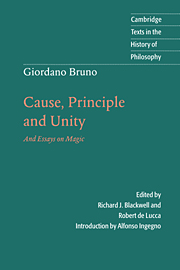On magic
Published online by Cambridge University Press: 05 June 2012
Summary
As with any other topic, before we begin our treatise On Magic, it is necessary to distinguish the various meanings of the term, for there are as many meanings of ‘magic’ as there are of ‘magician’.
First, the term ‘magician’ means a wise man; for example, the trismegistes among the Egyptians, the druids among the Gauls, the gymnosophists among the Indians, the cabalists among the Hebrews, the magi among the Persians (who were followers of Zoroaster), the sophists among the Greeks and the wise men among the Latins.
Second, ‘magician’ refers to someone who does wondrous things merely by manipulating active and passive powers, as occurs in chemistry, medicine and such fields; this is commonly called ‘natural magic’.
Third, magic involves circumstances such that the actions of nature or of a higher intelligence occur in such a way as to excite wonderment by their appearances; this type of magic is called ‘prestidigitation’.
Fourth, magic refers to what happens as a result of the powers of attraction and repulsion between things, for example, the pushes, motions and attractions due to magnets and such things, when all these actions are due not to active and passive qualities but rather to the spirit or soul existing in things. This is called ‘natural magic’ in the proper sense.
The fifth meaning includes, in addition to these powers, the use of words, chants, calculations of numbers and times, images, figures, symbols, characters, or letters.
- Type
- Chapter
- Information
- Giordano Bruno: Cause, Principle and UnityAnd Essays on Magic, pp. 103 - 142Publisher: Cambridge University PressPrint publication year: 1998
- 2
- Cited by



